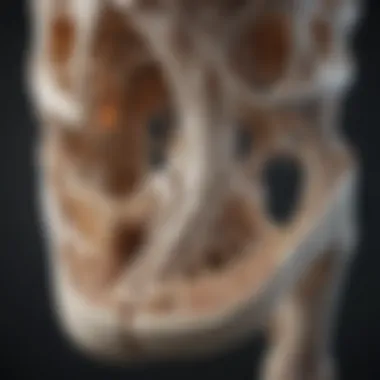Bone Growth Supplements for Height Optimization


Intro
Height is a topic of significant interest for many individuals, especially during the developmental years. This concern has fueled a burgeoning market for bone growth supplements aimed at height optimization. With the potential to influence growth plates and support bone health, these supplements attract attention from students, parents, and professionals alike. However, the effectiveness and safety of these products raise important questions that deserve careful examination. Understanding the underlying biological mechanisms, the current research landscape, and best practices surrounding these supplements will aid individuals in making informed decisions.
Research Highlights
Key Findings
Research has revealed that certain nutrients and compounds play a vital role in bone development and growth. Calcium, vitamin D, and protein are often emphasized for their importance in building strong bones. Studies indicate that inadequate intake of these nutrients can hinder growth. Additionally, compounds like collagen and beta-hydroxy-beta-methylbutyrate (HMB) have gained attention for their potential benefits in supporting bone density and muscle mass, respectively.
Moreover, it's crucial to note that the effectiveness of height supplements varies based on individual physiology. Some individuals may respond differently to supplements based on genetics, age, and overall health. Therefore, tailored approaches and dosage are arising as necessary considerations.
Implications and Applications
The implications of these findings extend beyond mere curiosity. Understanding which supplements work can assist in developing targeted strategies for height enhancement. Furthermore, individuals must approach the use of supplements with caution, considering both efficacy and safety.
The information gathered from various studies can help guide practitioners in advising patients. For many, integrating proper nutrition and exercise with supplements becomes a comprehensive method for achieving growth objectives.
"Optimizing height through nutritional strategies presents an intriguing opportunity, but it must be pursued with informed choices and care."
Methodology Overview
Research Design
A range of studies has examined the impact of bone growth supplements on height. Most notably, clinical trials and observational research often characterize this area of study. These investigations typically focus on specific populations, including adolescents and young adults, and assess the outcomes of varying nutritional interventions.
Experimental Procedures
Common methodologies include randomized controlled trials that evaluate supplement effects over defined periods, measuring key indicators of bone health. Outcomes such as bone mineral density, growth plate maturation, and overall height increase are carefully monitored. Data collection methods usually involve dietary assessments, biochemical tests, and growth monitoring.
As researchers continue to explore this field, emerging techniques and technologies may provide deeper insights into how supplements affect bone growth and health.
Intro to Bone Growth Supplements
The pursuit of height optimization often brings attention to various strategies, including nutritional supplementation. In this context, bone growth supplements emerge as a significant area of focus. These supplements may offer the potential to enhance bone density and overall growth, especially during critical growth periods. Understanding their role is essential for those looking to optimize their height effectively.
Defining Bone Growth Supplements
Bone growth supplements encompass a variety of products that are formulated to promote bone health and development. These supplements typically contain key nutrients thought to influence bone strength and growth. Common ingredients include vitamins and minerals like calcium, vitamin D, magnesium, and zinc. Each ingredient plays a distinct role in maintaining bone structure and promoting sufficient growth during developmental years.
It is crucial to differentiate between dietary supplements and general vitamins. While vitamins support overall health, bone growth supplements are specifically targeted to enhance skeletal development. A well-balanced diet is still paramount, but these supplements can act as an adjunct for those who may be deficient in important nutrients crucial for optimizing growth potential.
Purpose of Supplements in Height Increase
The primary objective of bone growth supplements is to support height increase by providing essential nutrients not readily available through diet alone. Height growth occurs predominantly during childhood and adolescence when bones are still developing. During these natural growth phases, the body requires an adequate supply of specific nutrients to facilitate the process. Without these nutrients, opportunities for maximum growth may be hindered.
In addition to the physiological need for these nutrients, some individuals may use supplements to ensure they are meeting daily requirements, especially if they have dietary restrictions or health conditions that affect nutrient absorption. Research indicates that appropriate supplementation can enhance overall bone density and may contribute to height increase in certain populations. This supplementation is more effective when combined with proper nutrition and healthy lifestyle choices.
"Supplements should not replace a balanced diet; rather, they should complement it, particularly during critical growth periods."
Understanding the intricate relationship between supplementation and overall height optimization remains crucial for those looking to maximize their growth potential.


Understanding Bone Growth
Understanding the mechanisms behind bone growth is crucial for those interested in height optimization. This knowledge allows individuals to make more informed decisions regarding the use of bone growth supplements. Proper comprehension of how bones develop can influence dietary choices, lifestyle habits, and the selection of supplements.
Bone growth is a complex biological process that involves cellular activity, nutrient availability, and hormonal signaling. Each of these components plays a vital role in determining not just height, but overall bone health. Therefore, exploring the biological basis and the factors that influence this process is important for anyone seeking to enhance their height naturally.
The Biological Basis of Bone Development
The biological foundation of bone development hinges on the intricate interplay of various cells and minerals. At the heart of this process are osteoblasts and osteoclasts, which are responsible for bone formation and resorption, respectively. Osteoblasts synthesize new bone material, while osteoclasts break down old bone tissue, ensuring a balance that contributes to overall bone density and strength.
During childhood and adolescence, bones undergo a rapid growth phase under the influence of factors such as growth hormones. Growth hormone stimulates the liver to produce insulin-like growth factor (IGF-1), which is essential for stimulating the proliferation of chondrocytes, the cells responsible for cartilage formation. This process fosters the growth of long bones, leading to an increase in height.
Additionally, the presence of essential nutrients is indispensable for effective bone development. Calcium, phosphorus, vitamin D, and magnesium work symbiotically to facilitate bone mineralization. Without these nutrients, even the best biological mechanisms can falter, resulting in impaired growth potential and fragile bones. Hence, understanding these biological principles can guide individuals in choosing the right supplements and dietary habits to support their growth objectives.
Role of Growth Plates
Growth plates, also known as epiphyseal plates, are zones of cartilage located at the ends of long bones. These regions are critical for height increase during the growth years. Growth plates undergo a process called endochondral ossification, where cartilage cells are gradually replaced by bone tissue. As children grow, their growth plates remain active, allowing bones to lengthen.
Once an individual reaches adulthood, these plates fuse, marking the end of vertical growth. This natural closure of growth plates emphasizes the importance of addressing height optimization during childhood and adolescence. Engaging in activities such as regular exercise and proper nutrition can influence the health and longevity of growth plates, enhancing their functional capacity for as long as possible.
It is noteworthy to consider that external factors such as hormonal imbalances and nutritional deficiencies can lead to premature closure of growth plates, thus stunting potential height growth. Therefore, understanding the role of growth plates not only emphasizes the biological complexity of bone growth but also underscores the need for intentional lifestyle choices that support optimal bone health throughout development.
"Bone health is essential for supporting overall growth and development, particularly during the formative years."
Key Nutrients for Bone Growth
Understanding the role of key nutrients in bone growth is essential for anyone who wishes to optimize their height through supplementation. These nutrients play a vital role in the processes of bone formation, density, and overall skeletal health. The right balance of nutrients can significantly influence one's growth potential, especially during the crucial developmental years. Focusing on these nutrients allows individuals to make informed choices about supplementation strategies.
Calcium: Building Blocks of Bone
Calcium is often heralded as the primary mineral responsible for bone health. It serves as a crucial building block for the bony structures in the body. During childhood and adolescence, the demand for calcium increases due to rapid growth. Insufficient calcium intake can lead to weakened bone structure and developmental issues.
The recommended daily intake varies by age, but ensuring an adequate supply through diet or supplementation is vital. Dairy products, leafy greens, and fortified foods are common sources of calcium. Some supplements, like calcium carbonate and calcium citrate, can help meet the body's needs, especially in cases where dietary intake is insufficient. However, excessive calcium intake can lead to negative side effects like kidney stones, so moderation is key.
Vitamin D: Enhancing Calcium Absorption
Vitamin D plays a supportive but crucial role in bone growth. It enhances the body's ability to absorb calcium in the intestines. Without sufficient vitamin D, the effectiveness of calcium intake diminishes. This vitamin not only aids in calcium absorption but also supports bone remodeling, which is the process of bone renewal that occurs throughout life.
Sun exposure is a natural source of vitamin D, but many people do not receive adequate amounts, particularly in regions with less sunlight. Foods such as fatty fish, fortified milk, and egg yolks also contribute to vitamin D levels. For those who struggle to maintain optimal levels through lifestyle and diet, supplements like vitamin D3 are commonly recommended. Regular testing can help monitor levels and guide supplementation.
Magnesium: Supporting Bone Density
Magnesium is another essential mineral that plays a significant role in bone health. It is necessary for the conversion of vitamin D into its active form, which further aids in calcium absorption. Magnesium also contributes directly to the structure of bone, influencing its density and strength.
Sources of magnesium include nuts, seeds, whole grains, and leafy green vegetables. The recommended daily amount varies by age and gender but should be considered in any supplementation plan. Supplements like magnesium oxide or magnesium citrate are widely available. Again, excessive intake can lead to health issues, making proper dosage vital.
Zinc: A Key Mineral for Growth
Zinc, though less commonly discussed, is a vital trace mineral in bone health. It supports the activity of osteoblasts, the cells responsible for bone formation. Zinc deficiency can lead to stunted growth and impaired bone development, especially during the early years of life.
Dietary sources of zinc include meat, shellfish, legumes, seeds, nuts, dairy products, and whole grains. For individuals with dietary restrictions or higher needs, zinc supplements come into play. It's important to monitor zinc intake, as too much can lead to toxicity, rather than enhancing growth further.


"A balanced intake of nutrients is crucial for maximizing growth potential and overall health."
In summary, the key nutrients for bone growth include calcium, vitamin D, magnesium, and zinc. Each plays a unique role in not only supporting height optimization but also ensuring overall bone health. A comprehensive approach that combines these nutrients through diet and supplementation can provide the foundation necessary for successful height enhancement.
Natural vs. Synthetic Supplements
In the realm of bone growth supplements aimed at height optimization, one significant distinction arises between natural and synthetic options. Understanding this difference is crucial for any individual contemplating the use of these substances. Natural supplements are derived from food sources or plant extracts, while synthetic supplements are manufactured through chemical processes. Each category presents its unique strengths and weaknesses.
Natural supplements often harness whole-food ingredients, which can provide a variety of nutrients in their bioavailable forms. These products tend to be perceived as safer by many consumers because they relate more closely to conventional dietary intake. Common natural supplements include extracts from plants rich in calcium and vitamins, such as alfalfa or nettle. They are believed to support bone growth while potentially minimizing adverse effects due to their organic nature.
On the other hand, synthetic supplements may offer a concentrated dose of specific nutrients targeted towards bone health. They can often be more accessible and cheaper than their natural counterparts. Yet, they come with concerns regarding their long-term impact on health. Patients use synthetic options for quick results, especially when needing a particular nutrient that may be lacking in diet.
In summary, evaluating the suitability of either option depends significantly on individual health profiles and dietary preferences.
Effectiveness of Bone Growth Supplements
The effectiveness of bone growth supplements is a focal point of this article. Understanding their role is crucial for anyone considering these products for height optimization. The benefits of these supplements can be influenced by various factors including individual needs, biological responses, and the specific ingredients used in each formulation. It is essential to differentiate between anecdotal claims and substantiated scientific findings when discussing effectiveness. As public interest in height enhancement grows, so does the scrutiny on empirical data confirming the efficiency of bone growth supplements.
Review of Scientific Studies
Scientific studies provide an important foundation for understanding the effectiveness of bone growth supplements. Research indicates that specific nutrients can positively impact bone health and growth. For instance, randomized controlled trials have shown that calcium and vitamin D supplementation can significantly improve bone mineral density. A systematic review published in the Journal of Bone and Mineral Research demonstrated that higher intakes of both nutrients correlated with increased bone strength in adolescents.
Furthermore, magnesium has been highlighted in multiple studies for its supportive role in bone density. A study in the American Journal of Clinical Nutrition found that increased dietary magnesium correlated with higher bone mineral content. These studies provide a scientific basis for the claims surrounding these supplements. Yet, the results can vary widely based on individual health conditions and lifestyle factors.
Case Studies and Anecdotal Evidence
Case studies and anecdotal evidence often accompany discussions about the effectiveness of bone growth supplements. Many individuals report personal success with specific products, attributing increases in height to their use. Stories of teens who have taken supplements like Peak Height or HeightMax and claim noticeable growth spurts are common.
However, it is vital to approach these anecdotal claims with caution. Personal testimonials lack the rigor of controlled scientific studies and can be influenced by numerous external factors such as genetics and overall nutrition. While these reports can be encouraging, they should not replace evidence-based conclusions drawn from systematic reviews and empirical research.
"Scientific evidence outweighs anecdotal success. A balanced view should consider both perspectives."
Safety and Side Effects
In the pursuit of height optimization through bone growth supplements, understanding safety and side effects is crucial. This section provides insights into potential risks associated with these supplements and outlines best practices for safe usage. Ensuring that supplements are both effective and safe will enhance the overall experience for users aiming to achieve their height goals.
Common Side Effects of Supplements
The common side effects of bone growth supplements can vary widely depending on the ingredients and individual responses. Here are some frequently reported side effects:
- Gastrointestinal discomfort: Many users experience issues such as nausea, abdominal pain, or diarrhea. This can be due to the body’s initial reaction to new supplements.
- Headaches: Certain minerals like calcium and magnesium may lead to headaches in some individuals, particularly if taken in excess.
- Fatigue or drowsiness: Some users report feeling fatigued, a possible reaction to high levels of certain vitamins or minerals.
- Allergic reactions: Rarely, some individuals may develop allergies to specific ingredients. Symptoms can include rashes, swelling, or difficulty breathing.
Recognizing these side effects is essential for users to monitor their health and make informed decisions about continuing or adjusting their supplementation.
Long-term Use Considerations
While many supplements can provide short-term benefits, long-term use considerations are equally important. Prolonged supplementation without professional oversight can lead to complications. Here are several factors to keep in mind:
- Nutrient Imbalance: Continuous intake of certain supplements can create imbalances in nutrient levels. For example, excessive calcium can interfere with magnesium absorption, potentially leading to deficiencies.
- Kidney Health: High doses of calcium and vitamin D may put extra strain on the kidneys. It’s vital for users with preexisting kidney conditions to consult a healthcare provider before starting a regimen.
- Monitoring Health: Regular check-ups become necessary if one intends to use bone growth supplements over an extended period. Health professionals can track vital signs and adjust recommendations based on individual needs.
- Effectiveness: Research into the long-term effectiveness of bone growth supplements remains limited. Users should assess their progress and be open to adjusting their strategies as needed.
By prioritizing safety and understanding side effects, individuals can approach bone growth supplements with more confidence. This knowledge empowers users to make informed choices, ensuring a healthier journey toward height optimization.


Regulatory Landscape
Understanding the regulatory landscape surrounding bone growth supplements is essential for anyone considering their use for height optimization. Regulatory frameworks ensure that supplements meet certain safety and efficacy standards, which helps protect consumers from potentially harmful products. In an unregulated market, users might be exposed to ineffective or even dangerous supplements. Hence, comprehending these regulations not only promotes consumer safety but also aids in making informed decisions about supplementation.
FDA Regulations on Supplements
In the United States, the Food and Drug Administration (FDA) oversees the regulation of dietary supplements, including those aimed at promoting bone growth and height enhancement. Under the Dietary Supplement Health and Education Act (DSHEA) of 1994, supplements are classified as a category of food, not as medications. This distinction means that manufacturers do not need to prove safety or efficacy before marketing their products. However, the FDA can take action against any supplement that is misbranded or adulterated.
The following key points outline the FDA's role:
- Labeling Requirements: Manufacturers must provide accurate information about the contents, dosage, and intended use on supplement labels. Misleading claims can lead to enforcement actions.
- Health Claims: The FDA allows certain claims regarding the health benefits of supplements, but all claims must be substantiated by scientific evidence. Notably, claims related to growth and height must adhere to strict scrutiny.
- Post-Market Surveillance: The FDA monitors supplements once they are on the market. Reports of adverse effects can lead to recalls or further investigation.
International Standards and Practices
Outside the United States, various countries implement their own regulatory frameworks for dietary supplements. These regulations vary in terms of stringency and scope, affecting how bone growth supplements are marketed and sold.
For example, the European Union has established rigorous guidelines for dietary supplements. All products must comply with the Novel Food Regulation, ensuring safety before reaching consumers. Additionally, the European Food Safety Authority (EFSA) evaluates health claims made by supplement manufacturers, often requiring robust scientific backing.
Key international practices include:
- Quality Control: Many countries enforce Good Manufacturing Practices (GMP) requiring supplements to be produced under standardized conditions.
- Verification Programs: Organizations like NSF International offer third-party testing to verify that supplements contain what the label claims. This builds consumer trust.
- Consumer Education: Various regulatory bodies promote education about dietary supplements, helping users make informed choices based on established standards.
Best Practices for Supplementation
Supplementation for bone growth and height optimization requires careful consideration. It is essential to approach this process with informed strategies to maximize benefits while minimizing risks. Adopting best practices not only ensures effective results but also supports overall health and wellbeing. In this section, we will explore important elements such as consulting healthcare professionals and integrating supplements with lifestyle choices.
Consulting Healthcare Professionals
Before starting any supplementation regime, it is crucial to consult with a healthcare professional. They can guide you based on individual health needs, medical conditions, and potential interactions with current medications.
- Personalized Advice: A healthcare provider can tailor recommendations specific to the individual’s health status. For instance, they can assess your current nutrient levels and suggest appropriate supplements to fill any gaps.
- Risk Assessment: Different individuals may have different sensitivities to supplements. Consulting a professional can help identify potential risks, thereby ensuring a safer approach.
- Monitoring Progress: Regular check-ups allow for ongoing evaluation of the supplement's effectiveness and adjustment of dosages as needed.
Involving a trusted healthcare professional can significantly enhance the success of supplementation strategies.
Integrating Supplements with Lifestyle Choices
Supplements work best when combined with healthy lifestyle choices. It is important to acknowledge that supplements are not a magic solution on their own. They should complement a well-rounded approach to growth and health, including:
- Balanced Diet: Consuming a variety of foods rich in necessary vitamins and minerals strengthens the impact of supplements. Foods like leafy greens, dairy, and lean proteins should be staples in your diet.
- Regular Exercise: Engaging in weight-bearing activities stimulates bone growth. Exercises such as running, jumping, and resistance training can enhance the effects of supplements.
- Proper Sleep: Sleep is crucial for growth. During deep sleep, the body releases growth hormone, which aids in bone development. Establishing good sleep hygiene can therefore support the effects of supplementation.
- Hydration: Staying hydrated is important for overall health, as water helps in nutrient transportation and absorption in the body.
Combining supplements with these positive lifestyle practices provides a comprehensive strategy that maximizes potential for growth. Incorporating these best practices facilitates not only height optimization but also promotes overall health.
Culmination
Summary of Findings
In summary, we have discussed how bone growth supplements can provide essential nutrients that contribute to bone development and maintenance. Key vitamins and minerals such as calcium, vitamin D, magnesium, and zinc are foundational to the processes involved in growth. Our review of scientific literature indicates varying degrees of effectiveness among different formulations. It is evident that while some supplements may promote height, the results can depend on several factors including age, genetic predisposition, and overall health.
Research supports that optimal intake of these nutrients can lead to improved bone density, but the desired height increase is not guaranteed.
Furthermore, we have highlighted both the pros and cons of natural versus synthetic supplements. Transparency regarding the sourcing and manufacturing practices is essential for consumers making informed decisions.
Future Directions in Height Enhancement Research
Looking ahead, research in the area of height enhancement is ripe for exploration. Investigating innovative compounds that may further stimulate bone growth or enhance the body's ability to utilize existing nutrients presents exciting possibilities. Moreover, conducting longitudinal studies could yield insights into the long-term impacts of supplement usage on growth patterns.
The regulatory landscape will also continue to evolve, which could influence the availability and composition of these products. Collaboration between researchers, healthcare professionals, and regulatory bodies will be vital in ensuring the safety and efficacy of height enhancement supplements. This concerted effort may pave the way toward new breakthroughs in optimizing growth potential while minimizing risks.
As we delve deeper into this domain, a multidisciplinary approach may yield the most comprehensive understanding of how best to support bone growth and overall health.



